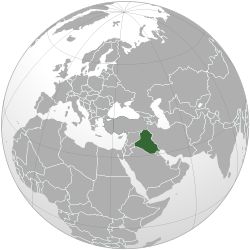A Russian Plan For Iraq Or Same Old Story? – Analysis
By JTW
By Habibe Ozdal
Russia would like to return to the sort of relationship it had with Iraq in the period before the Gulf War and thus enjoy the benefits that formerly accrued to it. However, apart from having a stake in the energy sector in Iraq and in developing the arms trade, Russia has still not formulated a general strategy although the path it is following is a familiar one.
As of December 2011, the U.S. military presence in Iraq had come to an end. To predict what Moscow’s Iraq policy will be from now on, you need to review the background of negotiations between Russia and Iraq in recent years.

Following the American occupation, most discussion has centered on the question of Iraq’s internal structure but this is not of vital importance for Russia. This is because since the breakup of the Soviet Union, Eurasia been the main priority for Russian foreign policy. Afghanistan’s location means that any instability there is of intense concern to Russia but the same is not valid for Iraq. So, just as in the past, policy toward Iraq in the new period now beginning is mainly directed at economic gains.
In 2008, the Kremlin cancelled 93 percent of Iraq’s $12 billion debts to Russia and signed an agreement providing for the remaining $900 million of the debt to be repaid over a 17-year period. In return for this, Lukoil, the giant Russian petrol company, obtained the right to return to the West Kurna field, which with its reserves of 13 billion barrels, is one of Iraq’s biggest. What’s more, in April 2009, Russia and Iraq agreed to reopen negotiations on the agreements signed before the U.S.-led invasion.
At the same time, statements by Nouri al-Maliki, the Iraqi prime minister, that Russian companies would play a major role in the reconstruction of Iraq were widely covered in the Russian press. The cancelation of Iraq’s debts from the Soviet period contained much greater symbolism than these figures. A clear indication of them came when al-Maliki visited Russia in 2009 and stated that following the cancelation of the debts, Russian-Iraq relations could now pave the way for development.
Syrian model for Iraq
The steps so far discussed are reminiscent of the preferential treatment for Syria used by Russia during the decade after 2000 to develop its relations with the Middle East. It is worth recalling that relations between Moscow and Damascus were at a low ebb during the first half of the 2000s; to reinvigorate them, Russia canceled 73 percent of Syria’s debts from the Soviet period. Relations then became much closer and within a short period, Syria had assumed the position of Russia’s closest ally in the Middle East. Russia’s notion of developing trade relations and canceling debts from the Soviet era aims at opening the way for an approach based on creating an alliance. Conversely, since in the long term the U.S. influence in Iraq in non-military dimensions will continue to exist for a good while, Russia’s moves may be seen as an attempt to claim its share of the “energy pie.”
The Middle East is one of the regions where there was a sharp decline in Russian influence after the end of the Cold War, so economic relations became the sole prop for Moscow. The Second Gulf War brought Russia up against the danger that it might lose its most important trading partner in the Arab world. Although it fiercely opposed the unilateral invasion of Iraq by the United States, it understood that protecting its economic interests was dependent on not breaking off relations with the U.S., and so it followed a pragmatic policy. While stepping up its cooperation with Iraq in the field of energy, Russia is trying to counter-balance the U.S. in the international arena in a way appropriate to the Great Power status it is carving out for itself.
This article was first published in Hurriyet Daily News.
